Gut health is the next frontier in the wellness industry, with products ranging from drinks to capsules. And as a registered dietitian nutritionist, I fully understand the importance of keeping our digestive tract humming along healthfully.
Not only does the health of our gut impact our digestion and nutrient absorption, but it can also impact our mood, our immune system, and even our sleep. I also know how confusing and overwhelming it can be to choose a supplement that fits your individual needs. Does the product really do what it says? How can you tell? I’m here to break it all down for you so that you can choose the best supplement to fit your digestive needs.
In this article, I’ll focus on the five best gut health supplements, exploring the pros and cons of these top options so that you can walk away confident in your choice.
2026 Winners for Gut Health Support
Though all five supplements in this article are excellent options, spanning from powders to capsules, these top three won out for providing excellent gut health- supporting ingredients.
.png)
- Our top choice: Live it Up Super Greens (price per serving: $1.33)
- Runner-up: VSL#3 Probiotic Capsules (price per serving: $1.97)
- Third place: Florastor Advanced Pro and Pre Probiotic and Prebiotic Fiber Supplement. (price per serving: $1.13)
The Best Supplements for Gut Health Support: Our Top Picks
The digestive tract is incredibly complex, with many factors influencing its health.
While most people think about probiotics, fiber, and digestive enzymes as the primary supplements that help support gut health, the amount and variety of vegetables consumed per week also play a huge role in a balanced gut microbiome. And yet, eating veggies is where most Americans fall short in their everyday diet. This fact plays a critical role in how I, as a registered dietitian, think about gut health supplements.
Here’s a look at our five gut health supplement picks.
1. Live it Up Super Greens
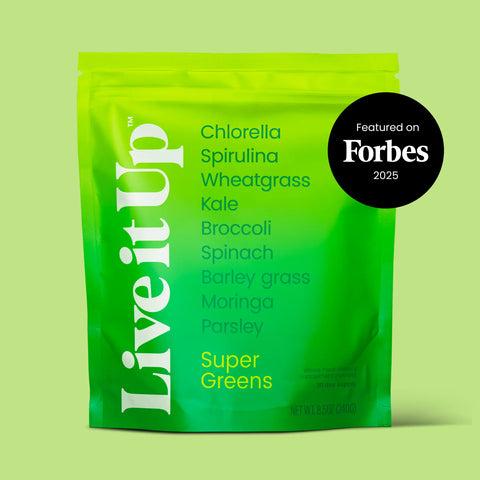
Live it Up is a company focused on providing high quality superfood formulas that help increase your intake of nutrient-dense and antioxidant-packed plants and the health benefits they may confer.
Price per serving (with subscription): $1.33
Super Greens Positives
- 20+ superfoods and organic vegetables
- 5 billion CFU (colony forming units) probiotics
- 3 grams of fiber, including from prebiotic sources
- 3 digestive enzymes
- 20+ vitamins and minerals
- No synthetic or artificial ingredients
- No fillers or added sugars
- Third-party tested and GMP-Certified
- Non-GMO and nut, soy, dairy, and gluten free
Super Greens Drawbacks
- Only sold on their website
- The powder can be a bit messy
- Lower fiber than others on this list
Benefits
Live it Up claims that Super Greens aids gut health, digestion, and bloating support. It also supports immune function and energy.
Quality and Safety
Super Greens not only goes through third-party testing for microbes, heavy metals, pesticides, herbicides, toxins and allergens, but is also produced in a facility that is certified for Good Manufacturing Practices.
Additionally, this greens powder is made with all organic vegetables, helping ensure that it is free from pesticides, herbicides, and other chemicals, and is also free of fillers and preservatives; artificial colors, flavors, and sweeteners; as well as added sugar.
Ingredients
Vegetables. With more than 20 plants, Super Greens helps to boost vegetable intake closer to the recommended servings per day. Research indicates that people who eat a wider variety of plants each week have a more diverse and healthy gut microbiome. Since Super Greens contains plants that are not normally consumed, it can help improve plant variety in the diet, therefore supporting gut health.
Probiotics. Super Greens contains 5 billion CFU of probiotics, including Lactobacillus acidophilus, Lactobacillus casei, Bifidobacterium bifidum, and Bifidobacterium lactis. These probiotic species have been shown to work synergistically, helping to enhance their biological activity.
Fiber. While Super Greens does not add prebiotic supplements like other greens powders, it does contain 3 grams of fiber naturally derived from its ingredients, many of which are rich in prebiotic fibers including barley and wheat grass, alfalfa leaf, and burdock root.
Digestive enzymes. Super Greens contains three plant-based digestive enzymes: papain, bromelain, and vegetable pepsin.
Nutrition Fact: Research is finding that the more plants you eat, the better your gut health. A new study shows that people who eat at least 30 different plants throughout the week have more of the ‘good’ gut bacteria, compared to those who just eat 10.
Taste and Convenience
Since Super Greens is a powder, it must be mixed with a beverage or food to be taken daily. This greens powder comes in two flavors: Original with a touch of mint, and Wild Berry, with a citrus, berry zing. Both options are subtly and naturally sweetened with monk fruit.
Our Verdict
Super Greens is our top choice because it’s the full package when it comes to gut health supplements. With more than 20 plants, an effective dose of probiotics, 3 grams of fiber that includes prebiotic sources, as well as digestive enzymes, this well-rounded greens powder is an excellent way to support your gut.
2. VSL#3 Probiotic Capsules
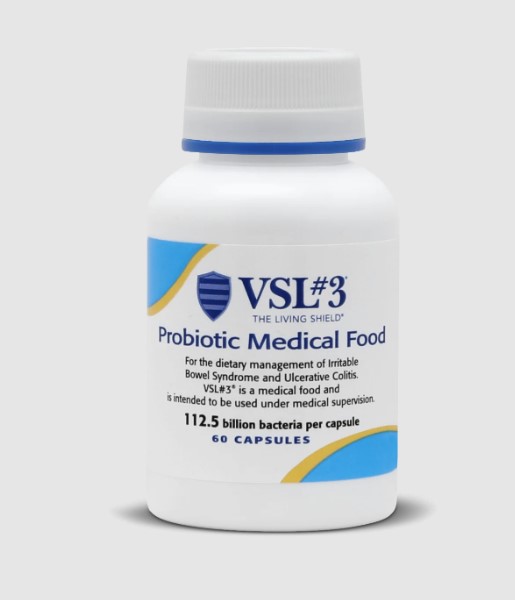
VSL has been producing quality, high potency probiotics for two decades, and their VSL#3 probiotic supplements have been extensively studied.
VSL#3 price per serving (with subscription): $1.97
VSL#3 Positives
- 112.5 billion CFU probiotics
- 8 strains of probiotics
- Research-backed
- Powdered form available
- Non-GMO and nut, soy, dairy, and gluten free
- Third-party tested
VSL#3 Drawbacks
- Must be refrigerated
- Must not be taken with carbonated beverages or hot liquids and/or foods
- Recommended to be used under the care of your healthcare provider
- No digestive enzymes
- No fiber or prebiotics
- No plants
Benefits
The company states the VSL#3 formula is scientifically formulated to manage gastrointestinal disorders.
Quality and Safety
VSL#3 is third-party tested to ensure potency and purity and produced in a facility that is GMP certified.
Ingredients
Probiotics are live bacteria that may impact human health when consumed in high enough doses. VSL#3 contains 8 strains of probiotics from 3 species: Streptococcus thermophilus, Bifidobacterium breve, Bifidobacterium lactis (previously classified as B. longum), Bifidobacterium lactis (previously classified as B. infantis), Lactobacillus acidophilus, Lactobacillus plantarum, Lactobacillus paracasei, Lactobacillus helveticus.
VSL’s research on these live microorganisms indicate they work well synergistically, have good survival rates, and are guaranteed until the expiration date.
Additionally, a systematic review of VSL#3, published on the National Institutes of Health website, demonstrated a nearly significant overall improvement in people with irritable bowel syndrome, though there was no change in abdominal pain.
Taste and Convenience
Because this product is a capsule, it is quite convenient. However, note that it must be refrigerated and taken with a cold beverage and/or food to help ensure the probiotics survive. If taking capsules does not work well for you, VSL#3 also comes in a powder, though you’ll pay more.
Our Verdict
VSL#3 is a high-potency daily probiotic supplement backed by research that would make a great addition to the supplement routine of someone looking to focus on this individual aspect of gut health. While this probiotic supplement may meet the needs of individuals who are already getting enough fiber and vegetables, it may not be well-rounded enough for the majority of people who are missing those critical gut-benefiting ingredients.
3. Florastor Advanced Pre and Pro Probiotic and Prebiotic Fiber Supplement
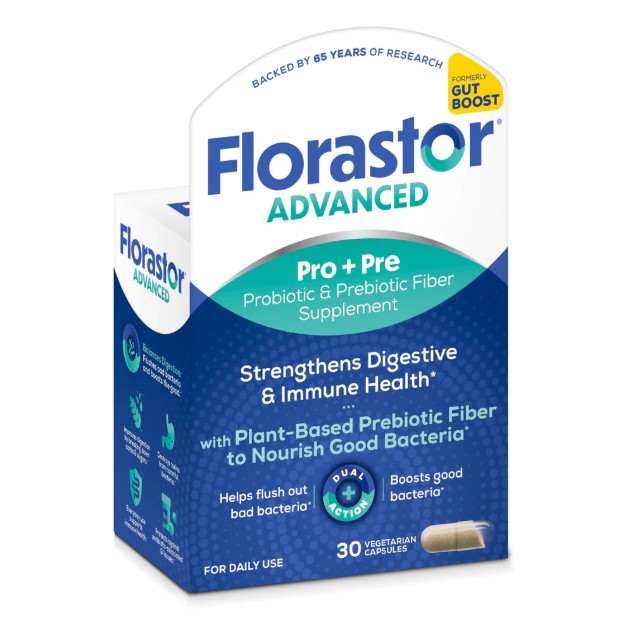
Florastor is a probiotic supplement that has been around for over 20 years. Owned by the company Biocodex, Florastor is the only probiotic on the market that contains the yeast-based probiotic Saccharomyces boulardii, for which Biocodex owns the exclusive rights.
Price per serving (with subscription): $1.07
Florastor Positives
- 500mg Saccharomyces boulardii probiotic
- 600mg prebiotic fiber
- Research-backed
- Gluten free, vegetarian
- Non-GMO
Florastor Drawbacks
- Not dairy free (contains lactose)
- Contains only one probiotic
- Unclear if it is third-party tested
- No digestive enzymes
- No plants
Benefits
Florastor’s website cites several potential health benefits, including:
- Flushes out unwanted bacteria and destroys toxins from harmful bacteria
- Boosts your own good bacteria
- Supports immune health
- Resistant to most antibiotics
- Prebiotics nourish the probiotic so that they flourish
Quality and Safety
Florastor has been on the market for over two decades, and the yeast-based probiotic Saccharomyces boulardii that it contains has been studied for almost 70 years. With that said, it is unclear if the product goes through third-party testing, though it is produced in a GMP-certified facility.
Ingredients
This gut health supplement is a synbiotic, meaning it contains both probiotics as well as prebiotics. This is an important combination as prebiotics are the ideal fuel for probiotics.
Saccharomyces boulardii is yeast probiotic. Research indicates that this probiotic has many potential health benefits and helps support health of the gastrointestinal tract. Florastor states they do not measure their supplement in CFUs because a yeast probiotic cell size is up to 10 times larger than bacteria-based probiotics. This makes between-brand comparisons more difficult. However, I was able to find out that Florastor contains about 5 billion CFU.
Chicory root fiber, also known as inulin, is a prebiotic fiber. What I like about Florastor Advanced Pre and Pro is that it contains more prebiotics than many other synbiotic supplements on the market.
Nutrition Fact: Some people have difficulty digesting fermentable carbohydrates and may experience GI symptoms such as gas and bloating after consuming them. If you’re someone with a sensitivity to fermentable carbohydrates, know that inulin falls into this category (it’s a fructan) and that you may have a reaction to supplements with this ingredient.
Taste and Convenience
As a capsule, Florastor is quite convenient and portable. Plus, it does not need to be refrigerated. If you are unable to swallow the capsule, the company recommends opening the capsule by twisting the two ends and mixing with a cold or room temperature food like yogurt or applesauce.
Our Verdict
Florastor Advanced Pre and Pro combines both prebiotics with probiotics, which gives it a leg up on solo probiotic supplements, and its use of a yeast-based probiotic is a unique feature. If you’re looking for an all-in-one gut health supplement with other elements, this one somewhat misses the mark.
4. Thorne FiberMend
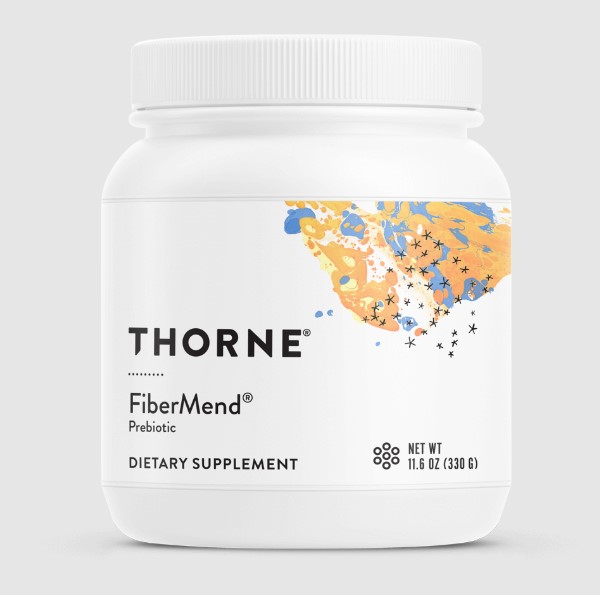
Thorne prides themselves in clean, high-quality supplements aimed to help people reach their wellness goals.
Price per serving: $1.40 (monthly subscription saves 10% on refills)
FiberMend Positives
- 7 grams of fiber
- Soluble, insoluble, and prebiotic fiber
- Third-party tested and GMP-certified
- Gluten, dairy, and soy free
FiberMend Drawbacks
- No probiotics
- No digestive enzymes
- Small number of plants
Benefits
FiberMend is promoted as providing a “healthy dose” of prebiotic supplement fiber to help feed and grow the beneficial bacteria in the digestive tract to help support GI wellness. Thorne also states that this product can:
- Enhance satiety
- Help maintain healthy blood sugar levels
- Promote regularity
Quality and Safety
Thorne is a company focused on the safety of their products, and all their products are third-party tested and GMP-certified through NSF. They also have an extensive list of ingredients they do not allow, including banned substances, fillers, additives, and allergens.
Ingredients
Fiber Blend. FiberMend contains several types of fiber that have been shown to help with gut health, including:
- Larch Extract. This tree-derived extract provides a prebiotic called Arabinogalactan, which has some great potential benefits, including helping to increase the good bacteria while decreasing the harmful ones.
- Apple pectin, a soluble fiber that can assist digestion.
- Partially hydrolyzed guar gum, a prebiotic fiber derived from guar plant seeds.
- Rice bran, which likely imparts both prebiotic as well as insoluble fibers.
Green tea phytosome. While not a fiber, this ingredient is packed with antioxidants that may help support healthy prebiotic activity.
Taste and Convenience
FiberMend is an unflavored, unsweetened powder, allowing you to mix it into any beverage or food without compromising taste. Reviews mention that it is a bit difficult to blend with cold liquids due to the clumping nature of fiber, but that it’s tasteless and easy to get down. While it may take a bit more planning to take a powder supplement when compared to a capsule, powders are generally easy to include in your everyday diet.
Our Verdict
Getting enough fiber every day is incredibly important for gut health and improved digestion, and taking Thorne FiberMend is an easy way to get more of this nutrient with a rich side of prebiotics. Because FiberMend is not an all-inclusive option, you may end up needing additional supplements with probiotics and digestive enzymes for optimal gut health.
Nutrition Fact: Consuming appropriate amounts of probiotics and fiber can also help preserve your gut lining, helping to knit the cells closer together. When these cells have larger spaces between them, called a “leaky gut,” it may lead to a weakened immune system.
5. MaryRuth's Ultra Digestive Food Enzymes
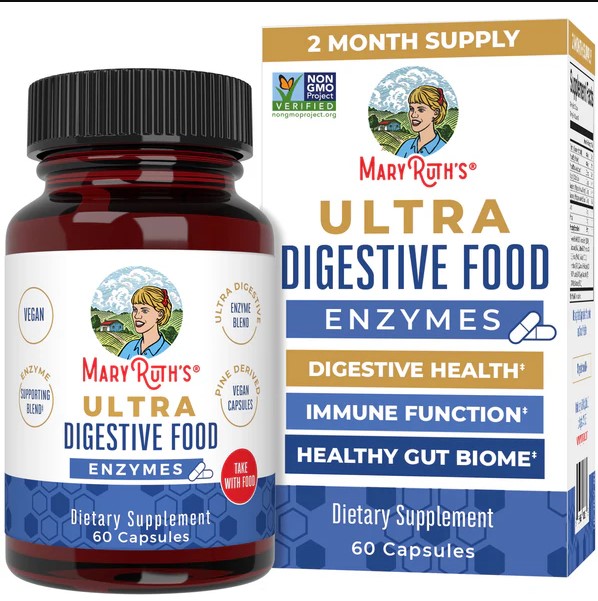
MaryRuth’s is a supplement company focused on clean, high-quality products that are organic, non-GMO, vegetarian, and plant-based.
Price per serving (with subscription): $0.75
Ultra Digestive Food Enzymes Positives
- 11 digestive enzymes
- 4 vitamins and minerals
- Clean Label Project Certified
- Non-GMO, third-party tested, and GMP-certified
- Free of gluten, dairy, nuts, and soy
Ultra Digestive Food Enzymes Drawbacks
- No prebiotics or fiber
- No probiotics
- Only one plant
Benefits
According to MaryRuth’s, Ultra Digestive Food Enzymes are formulated to support digestion and help with the occasional bloating, gas, and discomfort. This digestive enzyme supplement may also support a healthy immune system and support your gut biome.
Quality and Safety
Like many of the other brands on our list, MaryRuth’s is focused on the quality of their products. This digestive enzyme complex is non-GMO, third-party tested, and GMP-certified.
Ingredients
This supplement contains a wide array of digestive enzymes, including those that help break down carbohydrates, fats, proteins, fiber and lactose.
Enzyme blend: Protease blend, amylase blend, glucoamylase, invertase, pectinase, cellulase, hemicellulase, xylanase, lipase, lactase, alpha-galactosidase, beta-glucanase.
Taste and Convenience
Digestive enzymes work best when taken before eating, which is why MaryRuth’s recommends taking this supplement prior to each meal.
Our Verdict
As far as digestive enzymes go, MaryRuth’s Ultra Digestive Food Enzymes is an excellent option that provides digestion support to help break down all the different foods you may be consuming. With that said, digestive enzymes are just one part of our gut health puzzle.
Key Considerations for Gut Health Supplements
Your gut health is incredibly individual, and the supplement you choose should reflect this. No matter which supplement is right for your unique needs, there are specific features to look for (or avoid!) that everyone should be aware of.
First and foremost, always chat with your healthcare provider before adding any new supplements into your daily routine.
Ingredients to Look for
Clean, high-quality supplements should be on everyone’s radar. Look for products that include all-natural, organic ingredients when possible.
If you know what specific gut-benefiting ingredient would work best for you, look for a supplement that focuses on that. If you’re unsure, consider an all-inclusive supplement that incorporates plants, probiotics, fiber, and digestive enzymes to help cover your bases.
Ingredients to Avoid
Certain ingredients may cause more harm than good and could go against your ultimate goal of gut wellness. To help keep your GI tract on the up-and-up, consider avoiding: artificial sweeteners and colors; fillers and preservatives.
Sugar alcohols such as sorbitol and xylitol may cause digestive issues like gas and diarrhea for some people.
There is also some research implicating stevia extract in gut dysbiosis, which is an imbalance between the good and bad bacteria.
Recommended Doses
While choosing to take a gut health supplement is a great first step, the supplement needs to be dosed just right—not too little and not too much.
- Probiotics: Look for a supplement with at least 5 billion CFU. This can help ensure an effective dose.
- Fiber: Find a supplement with ingredients that deliver prebiotics and that offers at least 3 grams of fiber per serving—but ideally, no more than 10 grams. More than this may cause constipation, especially if you’re not taking in enough fluids as you increase your fiber intake!
- Greens: Since the goal is amping up the total number of plants per week, a greens powder with at least 15-25 different plants is ideal. However, more than 35 may mean the plants are not effectively dosed since only so much of each can fit in the scoop.
- Digestive Enzymes: Each type of macronutrient we eat requires different digestive enzymes to help break them down. Look for a supplement with at least 3-5 different digestive enzymes to help with digestion and absorption.
Quality Control
All of the supplements on our list come from companies with good quality control, however, not all supplement companies uphold the same standards. Make sure the supplement you choose is:
- Third-party tested, which is sometimes indicated with a “USP” or “NSF” symbol on packaging. Otherwise, the company will indicate third party testing on their website.
- Manufactured in a Good Manufacturing Practice-certified facility
- Made with organic ingredients. This is not always possible in supplements—for example, probiotics and digestive enzymes cannot be considered organic or inorganic—however, for greens powders this may be a standard that you want to uphold.
Top Tips to Help With Digestive Health
Digestive wellness starts with what you eat.
Choose a diet rich in plants, such as vegetables, fruits, whole grains, nuts, and seeds, will help keep a healthy diversity of good bacteria in your gut. These foods offer a wealth of fiber, antioxidants, vitamins, and minerals—all nutrients that support our gut health.
Choose foods rich in probiotics, such as yogurt with active cultures, kefir, kimchi, sauerkraut, tempeh, and miso, can help to naturally support your gut microbiome.
Minimize certain foods can also help keep your digestive system and beneficial microbes healthy in the long run. Consider eating less processed meats, ultra-processed foods, artificial sweeteners and colors, and fried foods.
Additional tips to help keep your gut happy and digesting well:
- Chew your food thoroughly! Digestion starts in the mouth.
- Focus on good posture while you eat. Slouching can cause GI discomfort during digestion.
- Eat slowly. Being mindful will help you swallow less air while eating, which can help reduce gas and bloating.
Final Thoughts
The health of our gut impacts not only digestion, but many other aspects of our general wellness. Choosing the right gut health supplement starts with understanding your health goals and eating pattern.
- Taking probiotics is an excellent way to help build a healthy beneficial microbe colony.
- Prebiotics feed your good bacteria, helping to keep them thriving.
- Digestive enzymes help you to break down and absorb the foods that you eat.
- Plants provide critical micronutrients, antioxidants, prebiotics, fiber, and other compounds that help to maintain digestive balance and an overall healthy and diverse microbiome.
Your gut needs all these things for optimal health! Since most people don’t know what they’re lacking, my recommendation is to go with an all-encompassing product like Live it Up Super Greens that balances plants, probiotics, digestive enzymes, and fiber from prebiotic-rich vegetables with nothing that will detract from your gut health.
Remember that what you eat every day is the most important strategy in helping to keep your gut healthy. Taking supplements can provide key support in areas you may be lacking.
Don't forget to chat with your healthcare provider about what supplement may work best for you.
Frequently Asked Questions
Read on for a few more facts before you decide on the right health dietary supplement for you.
What are the signs of an unhealthy gut?
You may not have a balanced digestive system if you are experiencing bloating, gas, abdominal or stomach pain, and persistent diarrhea or constipation. Since gut health can also impact your mood and immune system, you may notice changes in these as well if your gut health isn’t up to par. Fatigue may also be a symptom to watch for if you aren't absorbing nutrients well.
If you suspect your gut is off balance, look at your overall diet to see where you can improve your intake and restore balance. Try taking a gut health supplement to help bridge nutritional gaps and consider talking to a gut health nutritionist.
How do I improve gut health?
Improving your gut health starts with your diet and lifestyle habits. Follow an eating pattern with plenty of whole foods, vegetables, fruits, whole grains, nuts, seeds, and beans for the micronutrients, antioxidants, amino acids, and fiber necessary for a healthy digestive system. Look to include probiotic-rich foods such as fermented foods and yogurt with active cultures. Food processing, preservatives, additives, and artificial colors and sweeteners can also impact the health of our gut.
Alongside complementary and integrative health strategies, dietary supplements can help fill in the gaps where your diet is lacking. For example, taking probiotic products could help support your healthy microbiome, while a prebiotic fiber supplement can help fuel your beneficial bacteria. A digestive enzyme may help you better break down and absorb food.
What is the best supplement for gut health?
Everyone’s gut health needs are individual, but a product with multiple gut-benefiting ingredients is often a good choice. These supplements have ingredients that work synergistically, meaning their ingredients work together to improve gut health issues.
Rather than taking multiple supplements, some people opt for an all-encompassing product such as Live it Up Super Greens, which combines more than 20 plants, 5 billion CFU probiotics, 3 digestive enzymes, and contains 3 grams of fiber derived from vegetables rich in prebiotics. These are all components important for a healthy gut and digestion.
Other supplements in this round-up, such as VSL#3 or Thorne Fibermend, could also be a strong addition to your routine. With that said, everyone's health needs are different. If you have just finished a round of antibiotics, your healthcare provider may suggest probiotics to help replenish your beneficial bacteria colonies. Some probiotic products have proven benefits for women’s health and to help ease antibiotic-associated diarrhea.
Is it worth taking gut health supplements?
Yes, it can be worth taking a gut health supplement if you are experiencing abdominal pain, poor immune function, or digestive problems. However, before choosing one, look at your diet to see what you may be missing. Are you getting enough vegetables and plants but not enough probiotic-rich foods? Are you getting enough fiber, but think you may need digestive enzymes?
Beginning your journey with a product that includes all the components important for gut health helps take the guesswork out of giving your gut (and your body) what it needs for optimal functioning. Interestingly, a healthy gut sustained with the right probiotics may positively impact bone health parameters and your urinary tract. So taking gut health supplements is not just for the health of your digestive system.
How do I fix my gut health asap?
What you eat is critical to the overall health of your gut. Here are the top tips:
- Make sure your diet is high in fiber and that you’re aiming for 30 different plants per week.
- Drink plenty of water to help with digestion and regular bowel movements.
- Chew thoroughly and slowly to help break down foods and mix them with digestive enzymes from your saliva before they move onto the stomach.
- Take an all-in-one gut supplement, such as Live it Up Super Greens, so that the gut-benefiting components can work their best synergistically.
- Reduce stress. Your gut communicates with your brain via the nervous system. So stress and other negative emotions can have a big impact on the health of your digestive system!
Resources
- https://letsliveitup.com/products/supergreens
- https://www.vsl3.com/products/probiotic-capsules
- https://florastor.com/products/florastor-advanced-pro-pre-probiotic-prebiotic-fiber-supplement?variant=41195931795535
- https://www.thorne.com/products/dp/fibermend-trade
- https://www.maryruthorganics.com/products/ultra-digestive-food-enzymes-60-count-br-aid-digestion-enhance-healthy-gut-biome-immune-support
- https://www.dietaryguidelines.gov/sites/default/files/2020-12/Dietary_Guidelines_for_Americans_2020-2025.pdf
- https://pmc.ncbi.nlm.nih.gov/articles/PMC5954204/
- https://www.mdpi.com/2079-7737/10/4/322
- https://pmc.ncbi.nlm.nih.gov/articles/PMC9147304/
- https://pmc.ncbi.nlm.nih.gov/articles/PMC7190945/
- https://pubmed.ncbi.nlm.nih.gov/30069978/
- https://pmc.ncbi.nlm.nih.gov/articles/PMC9147304/
- https://pubmed.ncbi.nlm.nih.gov/28525543/
- https://www.sciencedirect.com/science/article/pii/S0899900721001350
- https://pmc.ncbi.nlm.nih.gov/articles/PMC9028423/
- https://internationalprobiotics.org/home/probiotic-dosage-what-is-adequate/
- https://pmc.ncbi.nlm.nih.gov/articles/PMC10057430/
- https://pmc.ncbi.nlm.nih.gov/articles/PMC5745464/
- https://onlinelibrary.wiley.com/doi/10.1155/2021/3582989

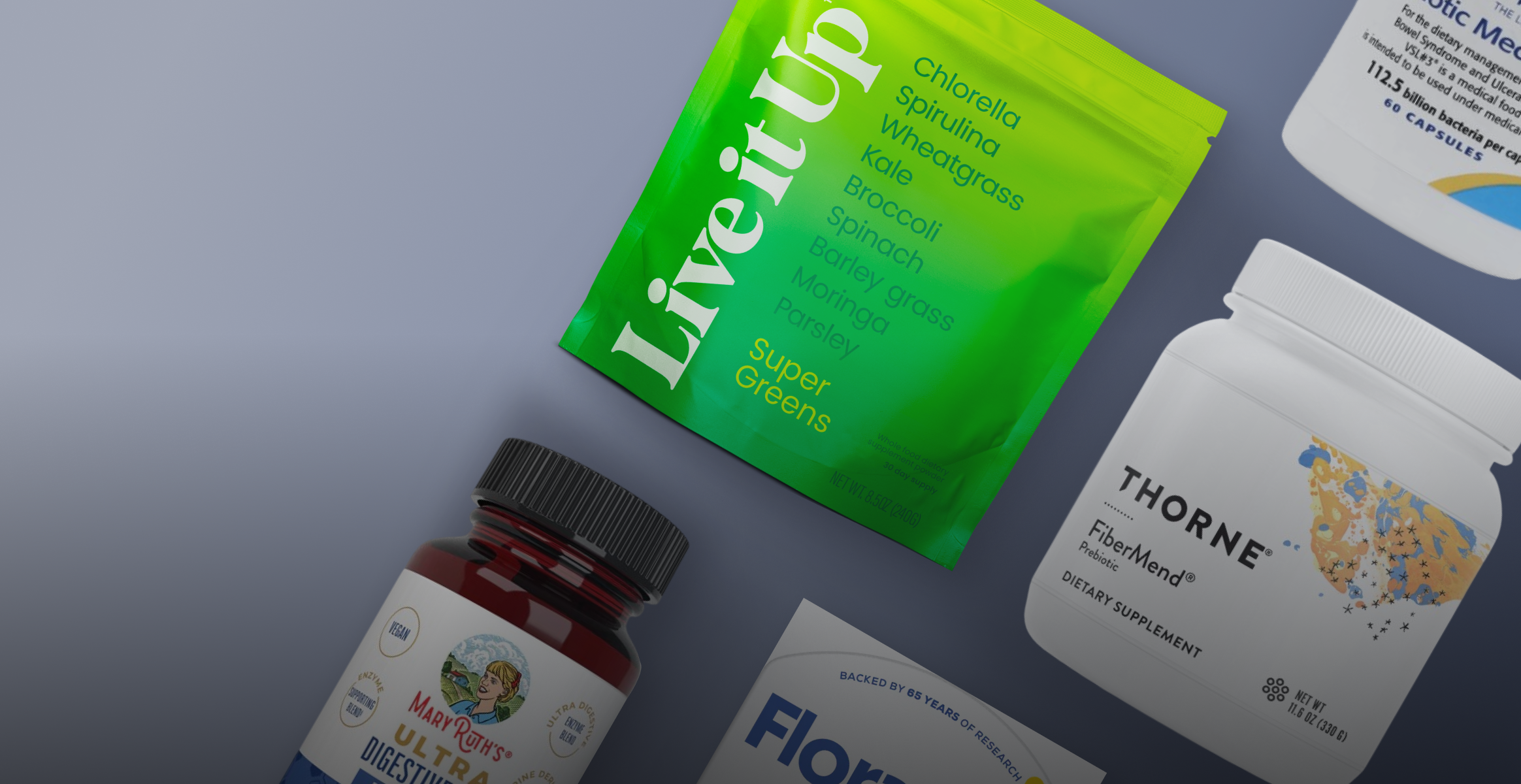



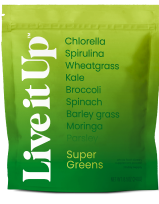
.png)








